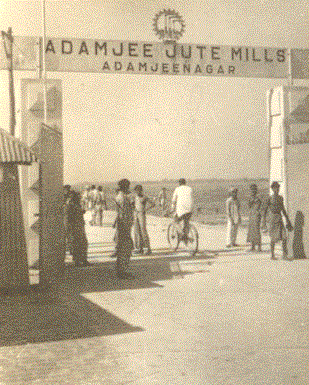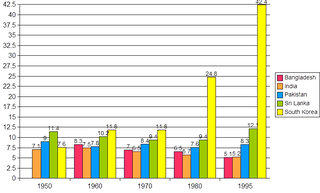Nationalization is the process of transforming privately-owned assets into public assets by bringing them under the public ownership of a national government or state. Nationalization contrasts with privatization and with demutualization. When previously nationalized assets are privatized and subsequently returned to public ownership at a later stage, they are said to have undergone renationalization. Industries often subject to nationalization include telecommunications, electric power, fossil fuels, railways, airlines, iron ore, media, postal services, banks, and water, and in many jurisdictions such entities have no history of private ownership.

The National Bus Company (NBC) was a nationalised bus company that operated in England and Wales between 1969 and 1988. NBC did not run buses itself, but was the owner of a number of regional subsidiary bus operating companies.

The Electricity Act 1947 was an act of the Parliament of the United Kingdom which nationalised, or bought into state control, the electricity supply industry in Great Britain. It established a central authority called the British Electricity Authority (BEA) to own and operate all public electricity generation and transmission facilities and created 14 area electricity boards with a duty to acquire bulk supplies of electricity from the central authority and to distribute and sell electricity economically and efficiently to industrial, commercial and domestic consumers. It vested 505 separate local authority and company owned electricity undertakings in the BEA with effect from 1 April 1948. The Electricity Act 1947 is one of a number of acts promulgated by the post-war Labour government to nationalise elements of the UK’s industrial infrastructure; other acts include the Coal Industry Nationalisation Act 1946; Transport Act 1947 ; Gas Act 1948; and Iron and Steel Act 1949.

Adamjee Jute Mill was a jute mill in Bangladesh. It was established in Narayanganj in 1950 by the Adamjee Group. It was the second jute mill in East Pakistan after Bawa Jute Mill which was the first Jute Mill in East Pakistan. Gradually, the mill became the largest jute mill in the world, exceeding the jute mills of Calcutta, India, and Dundee, Scotland. The mills were nationalised after the independence of Bangladesh in 1972. It was operated by the Bangladesh Jute Mills Corporation before being closed down in 2002.
The Saigol Group, also known as Kohinoor Group, is a Pakistani group of companies headquartered in Lahore. It was founded by Amin Saigol in the 1930s with a small shop that eventually developed into the Kohinoor Rubber Works.

The National Telecommunications Commission is an attached agency of the Department of Information and Communications Technology responsible for the supervision, adjudication and control over all telecommunications services and radio and television networks throughout the Philippines.
Chaudhry Zahoor Elahi was a Pakistani politician who rose to prominence from the small town of Gujrat, Punjab, Pakistan.

Girangaon was a name of an area now part of central Mumbai, India, which at one time had almost 130 textile mills, with the majority being cotton mills. The mills of Girangaon contributed significantly to the prosperity and growth of Mumbai during the later nineteenth century and for the transformation of Mumbai into a major industrial metropolis. Girangaon covered an area of 600 acres (2.4 km2), not including the workers' housing. The mill workers lived in a community, and they fostered a unique culture which shaped Mumbai at the turn of the twentieth century. This textile industry flourished until the early 2000s after which most of the mills were shut down, as the owners deemed them unprofitable and declared they were incapable of paying their workers' wages.
The Dawood Group is a group of companies headquartered in Karachi. It is active in diverse businesses and industries of the Dawood family-business and is owned by Dawood family.
National Textile Corporation is a central public sector undertaking under the ownership of Ministry of Textiles, Government of India. It owns 23 working textile mills which produce yarn and fabric. The company was incorporated in April 1968.

The nationalisation process in Pakistan was a policy measure programme in the economic history of Pakistan that negatively impacted the country's industrialization and undermined the trust of businessmen and investors. The process was first introduced, promulgated and implemented by Zulfikar Ali Bhutto and Pakistan Peoples Party to lay the foundation of socialist economics reforms to improve the growth of the national economy. Since the 1950s, the country had undergone a speedy industrialisation. But, as time progressed, the labour trade unions and labour-working class had increasingly strained relations with the industrial business oligarch class, having neglected to improve working conditions and failing to provide a healthy and safe environment for the workers in these industrial industries.

National Jute Manufacturers Corporation Ltd.(NJMC) is a central public sector undertaking under the ownership of the Ministry of Textiles, Government of India. It is headquartered in Kolkata, West Bengal. It was incorporated under the Companies Act, 1956 with an objective to takeover six jute mills, the management of which was earlier taken over by the Government of India under the Industries Act, 1951. At present NJMC is engaged in manufacturing of jute goods through its three running units, two units located at North North 24 Paragnas in West Bengal and one unit located at Katihar in Bihar. It has one subsidiary namely Birds Jute and Export Limited.

The Electricity (Supply) Act 1919 was an Act of the Parliament of the United Kingdom which amended the law with respect to the supply of electricity. It established the statutory body of the Electricity Commissioners ‘to promote, regulate and supervise the supply of electricity’ under the direction of the Board of Trade. It provided for the formation of electricity districts and, where necessary, the establishment of joint electricity authorities, ‘to provide or secure the provision of a cheap and abundant supply of electricity’.
Public Sector Undertakings (PSU) in India are government-owned entities in which at least 51% of stake is under the ownership of the Government of India or state governments.These type of firms can also be a joint venture of multiple PSUs. These entities perform commercial functions on behalf of the government. Depending on the level of government ownership, PSUs are officially classified into two categories: Central Public Sector Undertakings (CPSUs), owned by the central government or other CPSUs; and State Public Sector Undertakings (SPSUs), owned by state governments. CPSU and SPSU is further classified into Strategic Sector and Non-Strategic Sector. Depending on their financial performance and progress, CPSUs are granted the status of Maharatna, Navaratna, and Miniratna.
A.D.Cotton or Parvathi Mills Limited is a textile manufacturing company owned by the National Textile Corporation (NTC) in Kollam city, India. The company was founded in 1884 by British citizen A.D. Cotton and was the lifeline of Kollam before independence. This mill was taken for rent for running by a Tamil enterpriser after Independence as the land was owned by the Kerala State Textile Corporation at that time. It was later handed over to the NTC. The company has 120 employees, six of which are NTC staffers and 17 are casual workers. The plant has been shut down since 2008 pending modernisation. However, there is demand to build a bird sanctuary connected to backwaters.

The Department of Information and Communications Technology (DICT) is the executive department of the Philippine government responsible for the planning, development and promotion of the country's information and communications technology (ICT) agenda in support of national development.

Mohammad Abdus Sattar, known as M. A. Sattar, was a prominent Bangladeshi business magnate and politician. He was the founding chairman and managing director of Sattar & Company Ltd., Sattar Jute Mills Ltd., Hasna Shipbuilding & Navigation Ltd., and Rangpur Industries Ltd. In the 1980s, Sattar held several cabinet ministry positions, was elected as a member of parliament twice, and was chief whip in President Ershad's government from 1988 to 1990.

The Electricity (Supply) Act 1926 was an Act of the Parliament of the United Kingdom which amended the law on the supply of electricity. Its long title is: ‘An Act to amend the law with respect to the supply of electricity’. This Act was construed as one with the Electricity (Supply) Acts 1882 to 1922, and was cited as the Electricity (Supply) Acts 1882 to 1926. It established a statutory body, the Central Electricity Board (CEB), ‘with the duty of supplying electricity to authorised undertakers’ and to ‘appoint consultative technical committees’. It provided for the Electricity Commissioners to prepare and transmit to the CEB ‘electricity schemes’ for relevant areas, and which identified the most efficient ‘selected’ generating stations which were to be used to generate electricity for the Board. The Act provided for ‘main transmission line’ interconnections between selected stations and undertakings; and to standardise the frequency of generation; and other purposes. The provisions of the Act enabled the construction of the National Grid.

The Iron and Steel Act 1949 was an act of the Parliament of the United Kingdom which nationalised, or bought into state control, elements of the iron and steel industry in Great Britain. It established an Iron and Steel Corporation which acquired certain iron and steel companies. In a departure from earlier nationalisations the Corporation only acquired the share capital of the companies, not the undertakings themselves. The individual companies continued to operate under management Boards appointed by the corporation. The Iron and Steel Act 1949 was one of a number of acts promulgated by the post-war Labour government to nationalise elements of the UK's industrial infrastructure; other acts include the Coal Industry Nationalisation Act 1946; the Electricity Act 1947; Transport Act 1947 ; and the Gas Act 1948.








